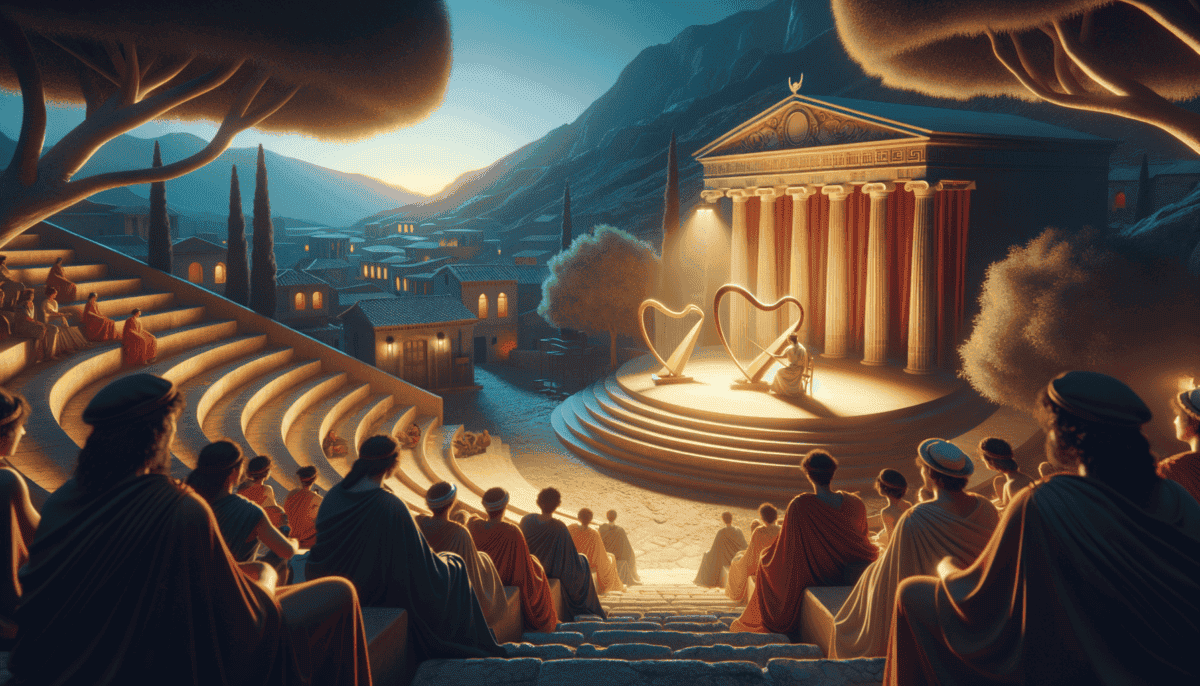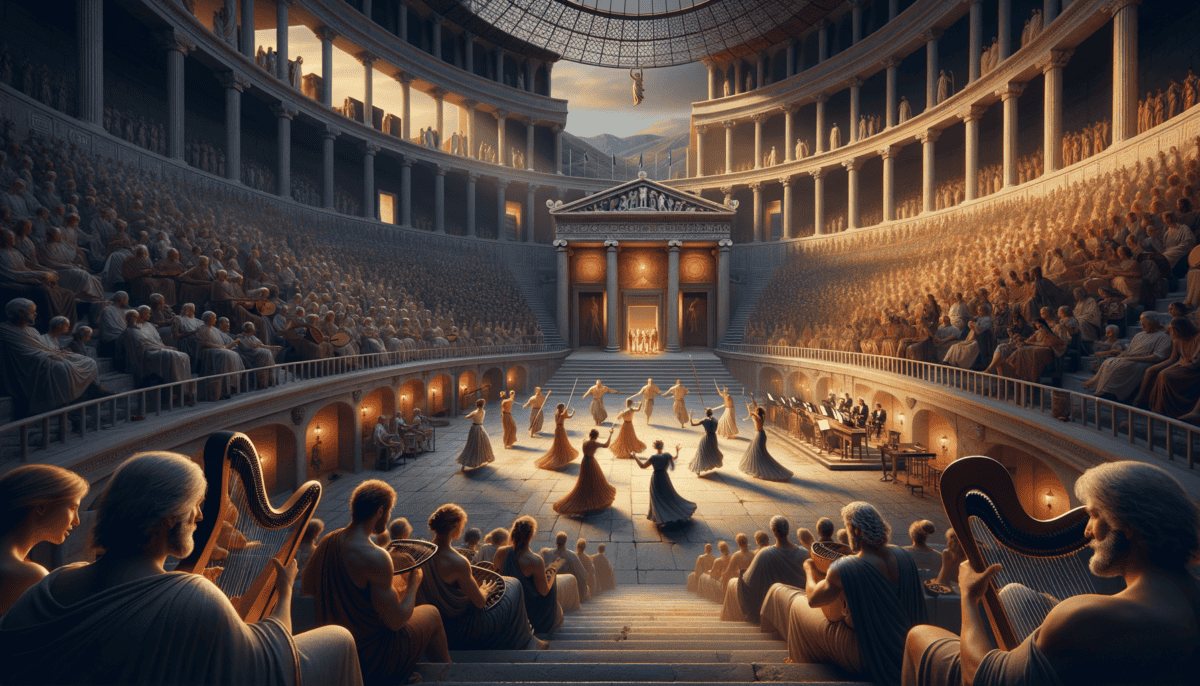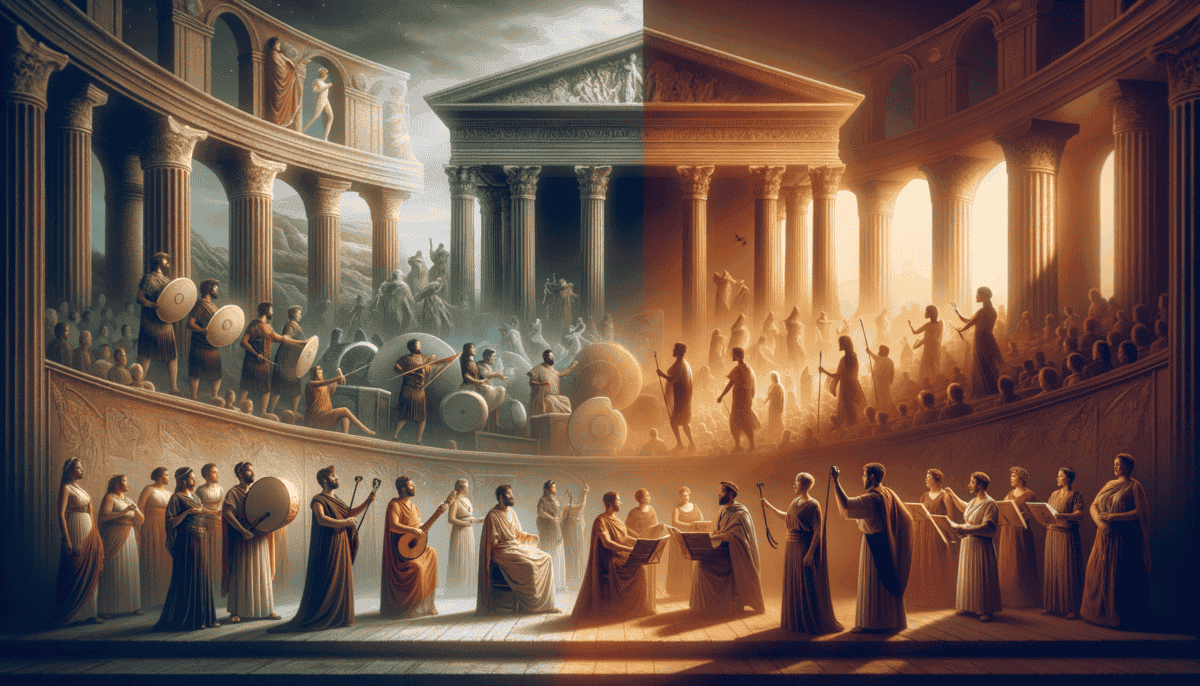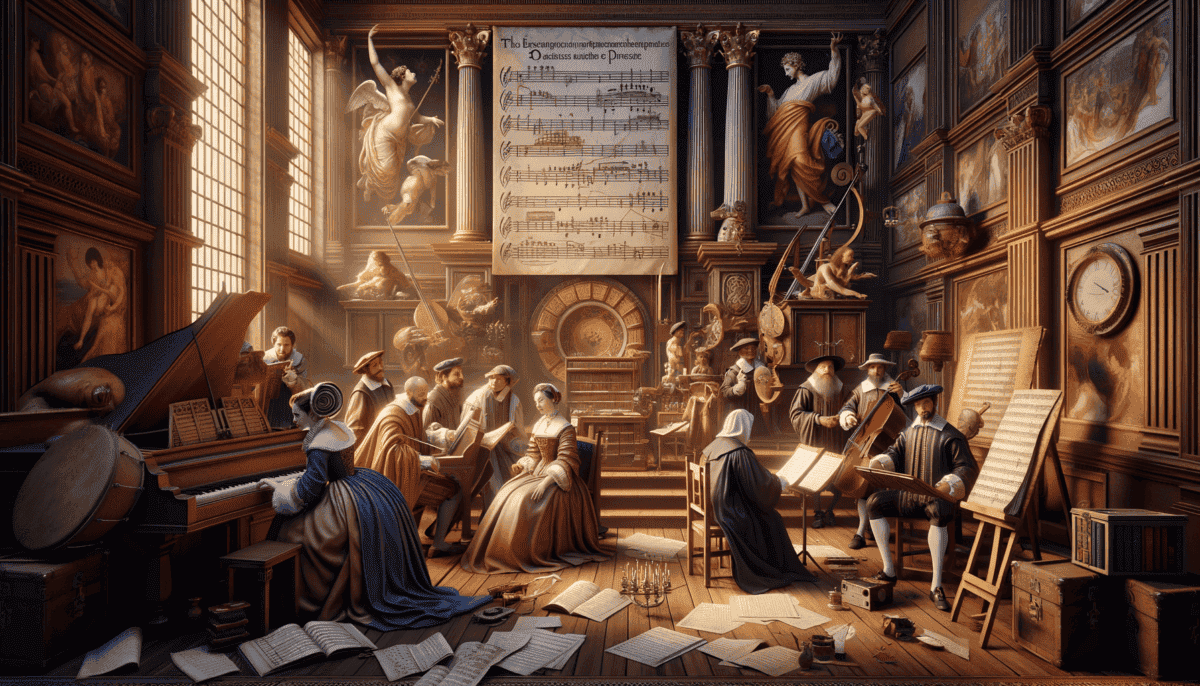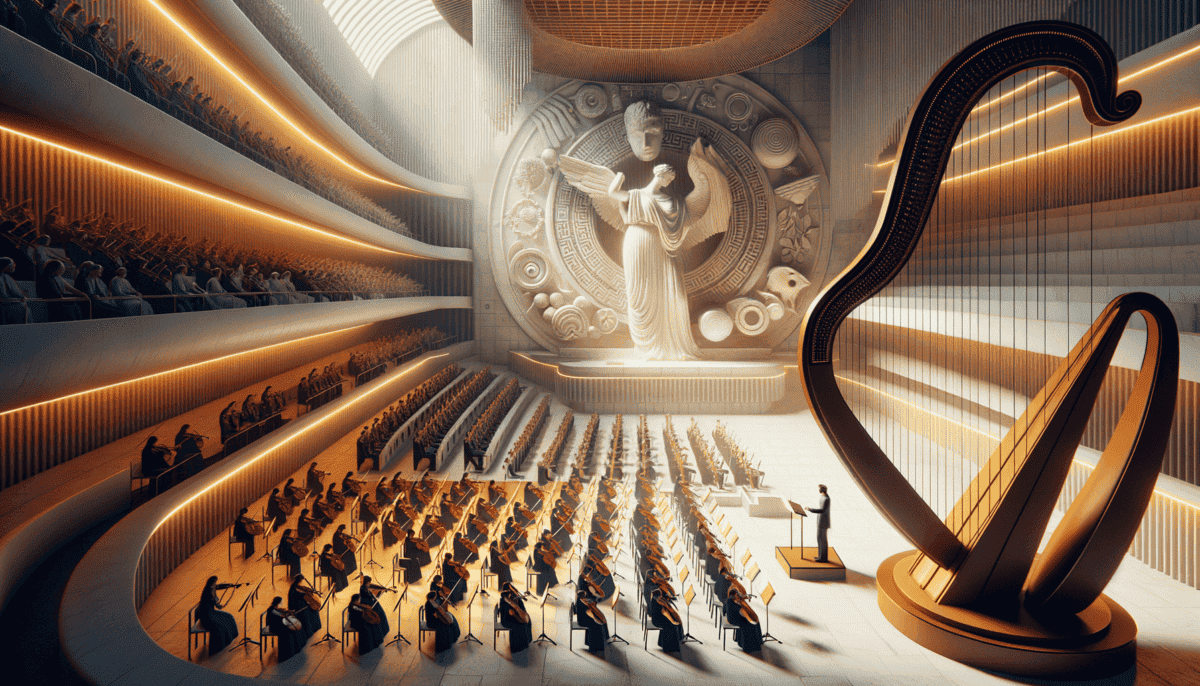The Whispers of the Muses
Long ago, on Mount Olympus, magic filled the air. Nine special sisters called the Muses danced and sang. They made the most beautiful music anyone had ever heard!
"Listen," whispered Calliope, the oldest Muse. "Can you hear the music in the wind?"
Her sisters smiled and nodded. Each Muse had her own special gift. Some loved to sing, while others played instruments or told stories through dance.
Apollo, the god of music, watched over the Muses. He carried a golden lyre, which looked like a small harp. When he played it, even the birds would stop to listen.
"Music is a gift from the gods," Apollo would say. "It can make people happy when they're sad. It can help tell stories about heroes and adventures."
The ancient Greeks loved music so much that they believed it came from these magical beings. They made special instruments to copy the sounds they imagined the gods would make.
The First Musical Instruments
The Greeks made lots of cool instruments:
• The lyre – like Apollo's magical harp
• The aulos – like a flute with two pipes
• The kithara – a big wooden lyre
• The drums – made from animal skin
• The syrinx – like tiny pipes in a row
"Every instrument has its own voice," said Euterpe, the Muse of music. She loved teaching humans how to play these instruments.
“When humans make music, they speak the language of the gods,” Euterpe would say with a smile.
The people of Greece would gather in big outdoor theaters. They would listen to musicians tell stories through songs. These stories were about brave heroes, great adventures, and the gods themselves.
Music’s Special Power
The Muses knew that music had special powers. It could:
– Help them remember important stories
– Bring communities together
– Make celebrations more fun
– Help people express their feelings
Sometimes, when people were feeling sad or scared, they would hear a beautiful melody floating down from Mount Olympus. That was the Muses, sending their love through music.
"Our music will live forever," said Terpsichore, the Muse of dance. "As long as people keep singing and playing instruments, a little bit of Mount Olympus will always be with them." ✨
Young musicians would practice every day, hoping to make music as beautiful as the Muses. They believed that when they played well, the gods were smiling down on them.
And so, the sweet melodies of ancient Greece floated through time, carried on the whispers of the Muses. Their songs would inspire people for thousands of years to come, teaching us that music is one of the most magical gifts we have.
The stories of the Muses and Apollo didn't end there. Their influence would grow stronger as humans learned more about the power of music. Musicians would keep discovering new ways to make beautiful sounds, just like the gods taught them.
Songs of the Ancient World
The sun rose over Athens, where young Theron sat with his teacher, holding a beautiful wooden lyre.
“Today,” said the teacher, “we learn about the magic of our instruments.”
Theron’s fingers touched the strings gently. The lyre had seven strings, each making a different note. It was shaped like a U with two arms reaching up to hold the strings.
The Special Lyre
“This instrument,” the teacher explained, “is sacred to Apollo. Legend says he made the first one from a turtle shell!”
Theron’s eyes grew wide. “A turtle shell? Really?”
“Yes! And listen to how sweet it sounds.” The teacher played a soft melody that made everyone smile.
“Music tells our stories better than words alone,” the teacher said wisely.
The Magical Aulos
Next, the teacher showed them another instrument – the aulos. It looked like two pipes joined together. When played, it made music that sounded like birds singing!
Important things about the aulos:
• It was played at big parties
• People danced to its happy tunes
• It could be heard from far away
• Players could make it sound like singing
• It was often played with the lyre
“The aulos brings joy,” said the teacher. “It makes people want to dance and celebrate!”
– Big festivals
– School lessons
– Theater shows
– Religious events
– Family parties
Music Tells Stories
In the busy marketplace, musicians would gather to play their instruments. They told stories about heroes and gods through their songs.
“Listen!” said Theron’s friend Maia. “That song is about brave Hercules!”
The musician played faster, making the music sound exciting as he told the story. Everyone stopped to listen. Some people even started to dance!
The Power of Music
As the sun began to set, Theron practiced his lyre at home. His little sister watched with big eyes.
“Can you teach me?” she asked.
Theron smiled and showed her how to pluck the strings gently. Together, they made sweet music that filled their home with joy.
That night, as stars twinkled above Athens, music could be heard everywhere. In homes, in temples, and in the streets, the instruments of ancient Greece kept playing their magical songs.
The music of ancient Greece would travel far and wide, teaching people new ways to make beautiful sounds. These special instruments would inspire musicians for many years to come, showing how powerful music can be.
Where Music Meets Magic
The grand theater of Epidaurus stood tall against the blue sky. Its stone seats curved like a giant hug around the stage. Little Sofia sat with her grandfather, looking at all the people coming to watch the show.
“Grandpa, how can everyone hear the music so well?” Sofia asked.
“It’s the magic of the theater,” he smiled. “The Greeks built it just right. Listen…” He dropped a small coin on the stone. The sound rang clear and true. ✨
Music Makes You Feel
The musicians took their places. Some held lyres, others had their aulos pipes ready. The leader raised his hands, and beautiful music filled the air.
“Different music makes us feel different things,” Grandpa explained. “Happy music makes us dance. Sad music makes us cry.”
Sofia noticed how the music changed. When it was fast, she wanted to jump up and dance. When it was slow, she felt peaceful and calm.
The Colors of Sound
The Greeks had special ways to make music. They called them modes:
• Dorian mode – brave and strong
• Phrygian mode – exciting and lively
• Lydian mode – happy and sweet
• Mixolydian mode – thoughtful and quiet
“Each mode is like a different color,” Grandpa said. “Just like colors make pictures, modes make music special.”
The Dance of Feelings
A group of dancers twirled onto the stage. Their movements matched the music perfectly. When the music was soft, they moved like leaves in the wind. When it got louder, they leaped and spun.
“Look how the music makes them move,” Sofia whispered. “It’s like they’re flying!”
Grandpa nodded. “Music speaks to our hearts. It tells us how to feel without using any words.”
A Theater Full of Dreams
As the sun began to set, the final song began. The whole theater joined in, singing together. The sound was so beautiful it brought tears to Sofia’s eyes.
“Now you understand,” Grandpa said softly. “This is why we built such special places for music. It brings people together. It makes us feel things we can’t explain.”
Walking home under the stars, Sofia could still hear the music in her heart. She knew she would never forget this magical day in the ancient theater, where music painted pictures in the air and made stories come alive. ⭐
The Greeks had discovered something wonderful – music wasn’t just about making nice sounds. It was about touching hearts, sharing feelings, and bringing dreams to life. Their special theaters would inspire people for thousands of years to come.
Dreams Take Flight
Sofia couldn’t sleep that night. The music from the theater still danced in her head. She sat by her window, looking at the stars.
“Tell me more stories, Grandpa,” Sofia asked the next morning over breakfast. “How did the Greeks turn their myths into music?”
Stories Come Alive
Grandpa pulled out an old book with pictures of ancient Greek performers. “Look here, little one. The Greeks were the first to make stories sing!”
“They took their biggest stories – tales of brave heroes and mighty gods – and added music to make them more exciting. It was like painting with sound!”
“When Orpheus played his lyre, even the trees danced. When Hermes made the first lyre from a turtle shell, Apollo was so happy he made it his special instrument.”
The First Musical Stories
Sofia’s eyes grew wide as Grandpa showed her pictures of ancient performances. People wore masks and colorful clothes. Musicians played lyres and pipes.
“Just like in the theater yesterday!” Sofia jumped up. “The music told us how to feel!”
Making Magic with Music
The Greeks had special ways to tell stories with music:
• Singers would be the main characters
• Chorus would explain the story
• Musicians would create the mood
• Dancers would show the action
“This way of telling stories with music was so special,” Grandpa explained, “that people still use it today. We call it opera!”
From Past to Present
Sofia twirled around the room, pretending to be one of the ancient performers. “So when we watched the show yesterday, we were seeing something very old and very new at the same time?”
“Exactly!” Grandpa clapped. “The Greeks gave us the gift of musical storytelling. They showed us how to make stories more magical with music.” ✨
A Bridge Through Time
“Every time we tell stories with music,” Grandpa said, watching Sofia dance, “we’re doing something the Greeks started long ago. We’re keeping their dream alive.”
Sofia stopped dancing and hugged her grandfather. “I want to learn all the stories, Grandpa. I want to help keep the dream alive too!”
Outside, a bird began to sing. Sofia smiled, imagining it was telling its own musical story, just like the ancient Greeks did so many years ago.
Musical Dreams Come True
The morning sun peeked through Sofia’s window. She was already up, drawing pictures of the stories Grandpa had told her.
A Special Discovery
“Look what I found in the attic!” Grandpa called out. He held an old record player and some dusty albums. “These are special operas from long ago.”
“Can we listen, Grandpa?” Sofia asked, bouncing with excitement.
The Music Returns
The record crackled to life. Beautiful music filled the room. A woman’s voice soared like a bird.
“This is ‘Orfeo’ by Monteverdi,” Grandpa explained. “It tells the same story of Orpheus we talked about yesterday. It was one of the first operas ever made!”
“It’s like the Greeks are singing to us through time,” Sofia whispered, swaying to the music.
New Ways to Tell Old Stories
Grandpa showed Sofia pictures of the first opera houses. They looked like Greek theaters, but with roofs and fancy decorations. ✨
The Renaissance brought these changes to music:
• Bigger orchestras
• More singing parts
• Beautiful costumes
• Indoor theaters
• Written-down music
The Stories Live On
Sofia picked up her drawing pencils. “I’m going to draw all the Greek stories I learn about!”
A Special Performance
Later that day, Sofia put on her own show. She used Grandpa’s old curtains as a costume and sang a story about Apollo and his golden lyre.
“Bravo!” Grandpa clapped. “You’re just like those first opera singers who brought Greek stories back to life!”
The Music Goes On
As the sun set, Sofia and Grandpa sat by the record player, listening to more operas. Each one told a different Greek story with beautiful music.
“The Greeks gave us so many gifts,” Grandpa said softly. “But maybe their biggest gift was showing us how to make stories sing.”
Sofia nodded sleepily, still humming the melodies she’d learned. In her mind, ancient Greek theaters and modern opera houses danced together in perfect harmony.
Songs That Last Forever
Sofia sat at her bedroom window, watching the stars twinkle. The melodies from Grandpa’s old records still danced in her head.
A Morning Surprise
“Sofia! Come quick!” Grandpa called from downstairs. She ran down to find him holding tickets in his hands. “We’re going to see a real opera tonight!”
Getting Ready
Sofia put on her best dress. “Will it be like the Greek theaters we learned about?” she asked.
“Even better,” Grandpa smiled. “You’ll see how Greek music magic still works today!”
The Modern Theater
The opera house was huge and sparkly. Sofia saw these amazing things:
• Orchestra players with all kinds of instruments
• Singers in beautiful costumes
• Special lights that changed colors
• A big stage with moving parts
• People from all over the world in the audience
The Show Begins
The orchestra started playing. Sofia closed her eyes. She could hear the same kinds of feelings that Greek music shared long ago – happy, sad, excited, and peaceful.
Music Around the World
During the break, Grandpa showed Sofia pictures on his phone. “Look! People everywhere use music to tell stories, just like the Greeks taught us.”
Making New Music
After the show, Sofia couldn’t stop singing. “Can I write my own opera, Grandpa?”
“Of course!” he laughed. “That’s the best part about music – we can keep making new songs while remembering the old ones.”
The Next Morning
Sofia woke up early to work on her music. She mixed Greek stories with new tunes she made up. Her little songs carried the same magic that started thousands of years ago.
Sofia smiled as she wrote another song. She knew she was part of something special – a long line of people who used music to share their stories. From ancient Greece to her bedroom, the melody played on. ✨
As she sang her new song, Sofia felt connected to all the musicians who came before her. The Greeks had given the world a beautiful gift that would keep on giving forever and ever.


